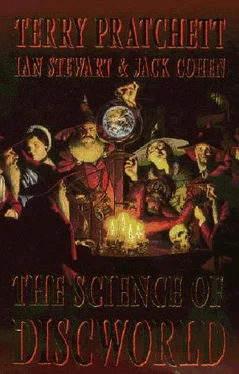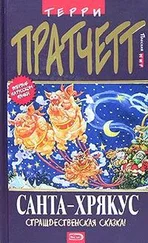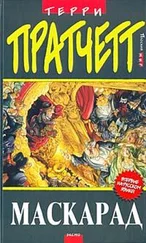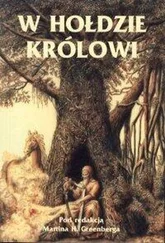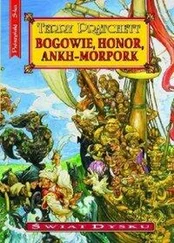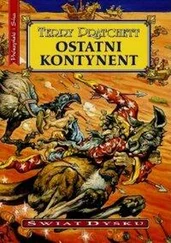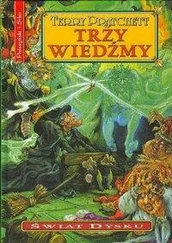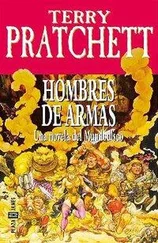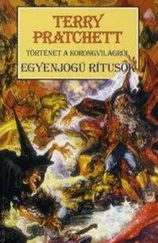Terry Pratchett - Science of Discworld
Здесь есть возможность читать онлайн «Terry Pratchett - Science of Discworld» весь текст электронной книги совершенно бесплатно (целиком полную версию без сокращений). В некоторых случаях можно слушать аудио, скачать через торрент в формате fb2 и присутствует краткое содержание. Жанр: Фантастика и фэнтези, на английском языке. Описание произведения, (предисловие) а так же отзывы посетителей доступны на портале библиотеки ЛибКат.
- Название:Science of Discworld
- Автор:
- Жанр:
- Год:неизвестен
- ISBN:нет данных
- Рейтинг книги:4 / 5. Голосов: 1
-
Избранное:Добавить в избранное
- Отзывы:
-
Ваша оценка:
- 80
- 1
- 2
- 3
- 4
- 5
Science of Discworld: краткое содержание, описание и аннотация
Предлагаем к чтению аннотацию, описание, краткое содержание или предисловие (зависит от того, что написал сам автор книги «Science of Discworld»). Если вы не нашли необходимую информацию о книге — напишите в комментариях, мы постараемся отыскать её.
Science of Discworld — читать онлайн бесплатно полную книгу (весь текст) целиком
Ниже представлен текст книги, разбитый по страницам. Система сохранения места последней прочитанной страницы, позволяет с удобством читать онлайн бесплатно книгу «Science of Discworld», без необходимости каждый раз заново искать на чём Вы остановились. Поставьте закладку, и сможете в любой момент перейти на страницу, на которой закончили чтение.
Интервал:
Закладка:
The Dean cleared his throat.
'I'd just like to say, Mustrum,' he began.
'Yes, old friend?'
'I'd just like to say ... I think I'd have made a much better Archchancellor than you.'
The whine stopped. The silence twanged. The wizards held their breath.
Something went 'ping'.
A globe about a foot across hung in the air between the faculty. It looked like glass, or the sheen of a pearl without the pearl itself.
From the squash court next door there was, instead of the wild roar of disorganized thaums, the steady thrum-thrum of purpose.
'What the heck is that ?' said Ridcully, as the wizards unfolded themselves.
HEX rattled. Ponder picked up the piece of paper.
'Well, according to this, it's the Roundworld Project,' he said. 'And it's absorbing all the energy from the thaumic pile.'
The Dean brushed some dust off his robe.
'Nonsense,' he said. 'Takes months. Anyway, how could that machine possibly know the spells?'
'Mr Turnipseed did copy in a lot of the grimoires last year,' said Ponder. 'It's vital that HEX knows basic spell structure, you see .,.'
The Senior Wrangler peered irritably at the sphere.
'Is this all it is?' he said. 'Doesn't seem much for all that effort.'
There was a frightening moment as the Dean walked up to the sphere and his nose, enormously magnified, appeared in it.
'Old Archchancellor Bewdley devised it,' he said. 'Everyone said it was impossible ...'
'Mr Stibbons?' said Ridcully.
'Yes, sir?'
'Are we in danger of blowing up at the moment?'
'I don't think so, sir. The ... project is sucking up everything.'
'Shouldn't it be glowing, then? Or something? What's in there?'
HEX wrote: +++ Nothing +++
'All that magic's going into empty space?'
+++ Empty Space Is Not Nothing, Archchancellor. There Is Not Even Empty Space Inside The Project. There Is No Time For It To Be Empty In +++
'What's it got in it, then?'
+++ I Am Checking +++, HEX wrote patiently.
'Look, I can stick my hand right in it,' said the Dean.
The wizards watched in horror. The Dean's fingers were visible, darkly, within the sphere, outlined in thousands of tiny sparkling lights.
'That was a really very foolish thing you just did,' said Ridcully. 'How did you know it wasn't dangerous?'
'I didn't,' said the Dean cheerfully, 'It feels ... cool. And rather chilly. Prickly, in a funny sort of way'
HEX rattled. Ponder walked back and looked down at the paper. 'It almost feels sticky when I move my fingers,' said the Dean.
'Er ... Dean?' said Ponder, stepping back carefully. 'I think it would be a really good idea if you pulled your hand out very, very carefully and really very soon.'
'That's odd, it's beginning to tingle...'
'Right now, Dean! Right now!'
For once, the urgency in Ponder's voice got through the Dean's cosmic self-confidence. He turned to argue with Ponder Stibbons just a moment before a white spark appeared in the centre of the sphere and began to expand rapidly.
The sphere flickered.
'Anyone know what caused that?' said the Senior Wrangler, his face bathed in the growing light of the Project.
'I think,' said Ponder slowly, holding up HEX's write-out, 'it was Time and Space starting to happen.'
In HEX's careful writing, the words said: +++ In The Absence Of Duration And Dimension, There Must Be Potentiality. +++
And the wizards looked upon the universe that was growing within the little sphere and spake amongst themselves, saying, 'It's rather a small one, don't you think? Is it dinner time yet?'
Later on, the wizards wondered if the new universe might have been different if the Dean had waggled his fingers in a different way. Perhaps, within it, matter might have naturally formed itself into, say, garden furniture, or one giant nine-dimensional flower a trillion miles across. But Archchancellor Ridcully pointed out that this was not very useful thinking, because of the ancient principle of WYGIWYGAINGW.
BEGINNINGS AND BECOMINGS
POTENTIALITY IS THE KEY.
Our immediate task is to start from a lot of vacuum and a few rules, and convince you that they have enormous potentiality. Given enough time, they can lead to people, turtles, weather, the Internet, hold it. Where did all that vacuum come from? Either the universe has been around forever, or once there wasn't a universe and then there was. The second statement fits neatly with the human predilection for creation myths. It also appeals to today's scientists, possibly for the same reason. Lies-to-children run deep. Isn't vacuum just... empty space? What was there before we had space? How do you make space? Out of vacuum? Isn't that a vicious circle? If in the past we didn't have space, how can there have been a 'there' for whatever it was to exist in? And if there wasn't anywhere for it to exist, how did it manage to make space? Maybe space was there all along... but why? And what about time ? Space is easy compared to time. Space is just ... somewhere to put matter. Matter is just ... stuff. But time, time flows, time passes, time makes sense in the past and the future but not in the instantaneous, frozen present. What makes time flow? Could the flow of time be stopped? What would happen if it did?
There are little questions, there are medium-sized questions, and there are big questions. After which there are even bigger questions, huge questions, and questions so vast that it is hard to imagine what kind of response would count as an answer.
You can usually recognize the little questions: they look immensely complicated. Things like 'What is the molecular structure of the left-handed isomer of glucose?' As the questions get bigger, they become deceptively simpler: 'Why is the sky blue?' The really big questions are so simple that it seems astonishing that science has absolutely no idea how to answer them: 'Why doesn't the universe run backwards instead?' or 'Why does red look like that?'
All this goes to show that it's a lot easier to ask a question than it is to answer it, and the more specialized your question is, the longer are the words that you must invent to state it. Moreover, the bigger a question is, the more people are interested in it. Hardly anybody cares about left-handed glucose, but nearly all of us wonder why red looks the way it does, and we vaguely wonder whether it looks the same to everybody else.
Out on the fringes of scientific thought are questions that are big enough to interest almost everybody, but small enough for there to be a chance of answering them reasonably accurately. They are questions like 'How did the universe begin?' and 'How will it end?' ('What happens in between?' is quite a different matter.) Let us acknowledge, right up front, that the current answers to such questions depend upon various questionable assumptions. Previous generations have been absolutely convinced that their scientific theories were well-nigh perfect, only for it to turn out that they had missed the point entirely. Why should it be any different for our generation? Beware of scientific fundamentalists who try to tell you everything is pretty much worked out, and only a few routine details are left to do. It is just when the majority of scientists believe such things that the next revolution in our world-view creeps into being, its feeble birth-squeaks all but drowned by the earsplitting roar of orthodoxy.
Let's take a look at the current view of how the universe began. One of the points we are going to make is that human beings have trouble with the concept of 'beginning'. And even more trouble, let it be said, with 'becoming'. Our minds evolved to carry out rather specific tasks like choosing a mate, killing bears with a sharp stick, and getting dinner without becoming it. We've been surprisingly good at adapting those modules to tasks for which they were never 'intended', that is, tasks for which they were not used during their evolution, there being no conscious 'intention', such as planning a route up the Matterhorn, carving images of sea-lions on polar bears' teeth, and calculating the combustion point of a complex hydrocarbon molecule. Because of the way our mental modules evolved, we think of beginnings as being analogous to how a day begins, or how a hike across the desert begins; and we think of becomings in the same way that a polar bear's tooth becomes a carved amulet, or a live spider becomes dead when you squash it.
Читать дальшеИнтервал:
Закладка:
Похожие книги на «Science of Discworld»
Представляем Вашему вниманию похожие книги на «Science of Discworld» списком для выбора. Мы отобрали схожую по названию и смыслу литературу в надежде предоставить читателям больше вариантов отыскать новые, интересные, ещё непрочитанные произведения.
Обсуждение, отзывы о книге «Science of Discworld» и просто собственные мнения читателей. Оставьте ваши комментарии, напишите, что Вы думаете о произведении, его смысле или главных героях. Укажите что конкретно понравилось, а что нет, и почему Вы так считаете.
